- Home
- Warwick Deeping
No Hero-This Page 2
No Hero-This Read online
Page 2
He pauses awkwardly.
“You have always been very loyal to me. If it is consideration for me that is holding you back——”
I understand. He is trying to tell me that I can and ought to be spared. I feel stubborn and miserable.
“Do you think I ought to go?”
“It’s your choice, my dear man, not mine.”
“I don’t want to go.”
He gives me a glance of affection.
“Does anybody want to go, really? Do you mind if I say something?”
“I’ll take anything from you.”
“Thanks, Stephen. It isn’t only your now, but your afterwards.”
“You mean, people——?”
He nods, and goes on writing.
“The women, and old men like Guthrie? Wait a bit. I think I see. The practice, I, as your partner.”
“I am not thinking of the practice, Stephen, nor of all the damned gossips and war-mongers and old women of both sexes. But——”
“I shouldn’t be persona grata? People wouldn’t want to have their tongues inspected by a shirker? Which means, that I should be letting you down.”
“No, Stephen. I am trying to be completely impartial. This war may be a bloody, silly business, muck and misery, but would you be quite happy in the future if you hadn’t had a share?”
I turn to the shelves and reach for a bottle.
“It’s cowardice, either way, to be afraid to go or to be afraid not to go.”
“It’s a choice every man has to make. Why not talk it over with Mary?”
“Mary!”
“Yes. Women can be curiously brave in hurting themselves in such a crisis.”
* * *
I make my confession to Mary in the drawing-room before dinner. Mary has been entertaining the Red Cross working-party, and signs of its activities are still apparent. I tell Mary quite casually that Randall and I have been talking it over, and that I think of joining the R.A.M.C. Mary is on the tuffet by the fire, and looking tired, but as I tell her, her face suddenly becomes fresh and tender. She jumps up, puts her arms round my neck, and kisses me.
“O, my dear, I’m so proud, so glad.”
Strange things women! Is Mary as conventional as the rest of them, or have all these other women sneered her into sacrificing to Moloch? I sit down in my chair, and she slips on to my knees.
“I’m not going to be afraid, Stephen.”
“Nothing to worry about.”
“After all, it isn’t so dangerous for a doctor. You may be in a hospital all the time.”
I realize how final the choice is, and that Mary will go about with a kind of new radiance, unashamed before all these other women. Why had I not understood this before? The strangeness between us, the silence.
* * *
I lie awake, feeling depressed and most unheroic. I am a coward, and I have surrendered to the more immediate threat of social coercion. Mary is asleep. Some of her last words to me were, “It’s so splendid to be able to help.” The words comfort me a little, for they are tinged with emotion, and emotion does oil the creaking joints of an illusion. Moreover, I am not so complete an egoist, and so inhuman as not to feel that I want to help, and I shall be doing the work that I love.
I cling to this thought.
But there is a sense of chilliness within me. I realize, if vaguely so, that I am surrendering that which is most precious to man, his freedom of will and of action. I am not a determinist, but in becoming one of an organized crowd I shall be accepting fatalism. I shall have no voice in where I am sent, or why. Someone in an office will tick my name off, and I shall be despatched somewhere like a parcel. It makes the sensitive, individual I shiver and feel cold.
II
The thing is done.
Sir Eric Burnham gave me an introduction to an important person at the War Office. The important person passed me to the proper authority. I was interviewed by a large, tired and tolerant man who treated me rather like an idiot child. I was quite without enthusiasm; so was he. My commission as a temporary lieutenant in the R.A.M.C. would be put through. Meanwhile, I could order my kit and uniform and go home and wait until I received the notice to report myself for duty.
When I came out of the building a band was playing in Whitehall, and trailing along with it a desultory crowd. I was conscious of a stomachic thrill, of the blare of the brass and the rumble of the drums. My loins and legs reacted. Almost, I felt a little swagger in me. And then I remembered that I was to be a doctor, a patcher up of the bodies that the war would smash. The soldier’s business is to kill. There may be a savage ecstasy in killing, especially when the other people have been making life for you an inferno, but, my work, if I get into or near the trenches, will be cold and deliberate, with no excitement save fear and the chance of escaping it or controlling it. I shall be like one small scavenger in the world’s shambles.
But how amazing, what a bloody and beastly anachronism! Organized murder and the organized collecting and reconditioning of those who have failed to become corpses! The silliness of it makes me feel nauseated. But, in the army will one be allowed to think?
I am in khaki, and in spite of myself tempted to show off my plumage. Mary is quite brazen in her eagerness to display me. She appears to think that the British Army has received a most important reinforcement. I hear that the Ponsonbys have asked us to dinner. We go, and those masterful wenches congratulate me.
I find that the atmosphere of Brackenhurst has changed. It is genial and approving, and almost I begin to feel a fine fellow.
Officially, to be correctly dressed I am supposed to wear spurs, and in my innocence I wear them. I know nothing about horses, and I find that the damned things scratch the insides of my boots as I walk.
I meet Guthrie in the High Street. He has had a dram, and is offensive and silly and patronizing. He pats me on the shoulder.
“By Jove, my boy, that’s better. Splendid!”
He almost shoves his face into mine, and I smell his breath.
“You’ll be quite a lad with the girls, Brent.”
He looks me over, leers, and suddenly with elaborate and mysterious friendliness he takes me by the arm and manœuvres me into the gateway beside Hayward’s, the grocers.
“I say, Brent, my dear chap, your spurs!”
I explain that they are supposed to be official, if superfluous.
“Quite, quite, but you have got ’em on upside down.”
I feel petulant and foolish. Does the ass expect me to sit down on somebody’s doorstep, and rectify the error? I manage to laugh, a little self-consciously. I thank him for his interest in my appearance. But Guthrie does not react to irony.
“That’s all right, my dear chap. Just a word to the wise.”
But that was the last occasion upon which I wore spurs. I left the damned things behind in the bottom of the hall cupboard, and when Mary posted them on to me at Southcliffe I took them out into the garden of my billet and poked them into a big euonymus bush.
* * *
I receive my instructions to report to the O.C. Military Hospital, Southcliffe, on April 1st.
April 1st! Almost the date suggests that I am to join the great and noble company of fools.
But the nearness and the finality of the event seems to fall like a stone into the life that Mary and I have shared. A peculiar sadness possesses me. Mary is very tender to me, and I feel very tender towards her, and to all the things that are associated with us, our bedroom, the garden where the daffodils are out, Mary’s chair. I do not trouble to call myself a sentimentalist. Even the mirror in the bathroom at which I shave is like the face of a pathetic and melancholy friend. I wander about the garden. The singing of the birds is a sort of sweet anguish. I know that I ought to go round saying good-bye to people, but I do not want to say good-bye. It is too depressing.
On our last day Mary and I take the car and drive up to Ling Hill. Splendid country, high and serene, with sailing firs and great beec
hes, scrolls of grassland and sheets of heather. It is a soft, serene Spring day. We spread a rug under an old fir and sit down. We can see the Downs and the sea. The gorse is in flower. We hold hands like lovers. We have little to say.
On the way back to the car Mary picks primroses and I help her. It seems a childish and simple but satisfying thing to do. When one feels rather forlorn and uprooted, one seems to revert to childish things, nursery days when there were no responsibilities, and our little fears could be conjured away by some compassionate and reassuring presence.
For me, an agnostic, there is no such presence, save perhaps Mary’s, and that is being taken from me.
* * *
The morning of my going. Randall is coming to drive me to the station in his car. We are wilfully and insincerely cheerful at breakfast. I tell Mary that if I am quartered at Southcliffe for any length of time she will be able to come and stay. I suspect that she believes that I shall be rushed over to France to-morrow!
Then begins that dreadful period of waiting. My train is at ten. Mary is not coming to the station. She helps the maid to clear away the breakfast things, while I go into the garden and light a pipe. Mary wants to feel busy, and I understand. Another serene Spring day. Some of the polyanthuses are in flower like crimson and gold brocade. The almond tree is past its prime. The incipient floweriness of the garden saddens me, and I go back to the drawing-room and leave the french window open.
Mary comes in. We are both restive and restless, like people in pain. I want to say all sorts of things to her, and am mute. My pipe is finished; I knock it out and put it in my pocket. I tell Mary that I will send her a cheque every week, half my pay. She says, “Yes, dear,” and smiles.
I try to be cheerful, but this damned waiting seems to stick in my throat.
The bell! Randall at last. I kiss my wife with a kind of passionate casualness. “Good-bye, my dear, don’t worry.”
I make for the door. I leave the door open, and in the hall I turn and look back.
I see Mary against the window. Her shoulders are giving little jerks, and her face is the face of a woman trying not to cry.
I rend myself from the impulse to rush back to her. We are both so near uncontrolled emotion.
“O, damn!”
I get hold of my kit-bag and open the front door. I see Randall’s kind, red face. I splurge something at him with banal cheerfulness.
“Here we are, off on the great adventure!”
He tries to take my kit-bag from me, but I won’t let him. I am forgetting my valise, which lies like a great green sausage by the oak chest. Also, my greatcoat.
Randall says gently: “Aren’t you going to take your bed, Stephen?”
I laugh, put on my greatcoat, get hold of the valise, and heave it into the car. Randall closes the front door.
* * *
One’s vanity has a very naïve quality. My volunteering for service had been such a shock in my quiet country life that I suppose I assumed my reporting at Southcliffe would be a serious and official affair. I travelled down to Southcliffe with a fat and vulgar little man also very newly uniformed and wearing the sign of Æsculapius. He started talking to me almost at once with complete candour. I had his life history in five minutes. Apparently, for him this war business was to be no end of a binge. He was the third partner in a colliery practice somewhere in the north, and in joining up he admitted that he was getting out of a groove, the daily round, domesticity and all that.
“Besides, I wasn’t such a fool as to sign on for foreign service.”
It had not occurred to me to do anything else. Bunce, that was his name, must have reacted to my questioning “Oh!” He stretched out his fat legs in their very new yellow gaiters.
“Any place where there are plenty of wenches will do me all right. Nurses are better than nothing. Wine and women, my lad, and not too much war.”
I am acutely disliking Bunce. I want to get rid of him, but at Southcliffe there is only one taxi, and we share it. We are driven up to an ugly red building on a hill. We and our baggage are deposited at the main entrance. We find an office full of khaki-clad clerks. Bunce swaggers in. The clerks do not appear inclined to take much notice of us, but Bunce is not a negligible person.
We are told to wait in the corridor. A clerk goes off to announce us, and returns with a very large and impressive-looking man wearing much ribbon, and in my innocence I salute him. He looks amused in a sneering and superior sort of way.
We say that we have been ordered to report for duty. Apparently, the hospital has not been notified. Nothing is known about us.
The large man, who makes me think of a big, white, enigmatic Tom Cat, takes our names.
“Better go down to the local pub, gentlemen, and report again to-morrow.”
Bunce looks heated.
“This is a damned funny way of doing business.”
The large man puts his moustache in order.
“War is a funny business, sir. Try the Crown.”
We go out and look at our baggage, and feel both it and ourselves superfluous.
* * *
The Crown accepts us. It is an old inn that has been modernized in raw red brick, and is excessively new and hideous and depressing. I am anxious to shed Bunce, for though I am feeling homesick and lonely, his tumescent fleshiness nauseates me, but at dinner they place us at the same table. Bunce asks me if I am coming hunting. Hunting? Yes, little bits of fluff over at Shellstone which is only two miles away. Foolishly I tell him that I have letters to write and he guffaws. I suppose he thinks me an uxorious, sentimental poop.
I try a walk along the Southcliffe front, but there are too many Tommies who salute me.
I go back to the Crown, write to Mary, get out a military manual, and read up stretcher-drill.
At ten o’clock I go to my room. The bed feels very cold and hard.
About midnight someone comes up the stairs, noisily and clumsily intoxicated. I suppose it is Bunce. I hear him swearing foolishly, and blundering about in the room next to mine.
* * *
I elude Bunce next morning by breakfasting early, and set out to report again at the hospital. The porter at the hotel has told me that there is a short cut up the hill. I find the path at the end of Trafalgar Terrace, a row of pleasant, late Georgian houses. The path slants up a steep, grassy slope, and as I climb it, with the sea covered with crinkles of light below me, I suppose that it will be my fate to be attached for training to some Field Ambulance. The hospital spreads itself amorphously on the plateau above. Orderlies are parading on the road leading to the administrative offices. I am shy, and feeling very raw and apologetic. I manage to sneak past the back of the parade, and so to the main door.
The large person happens to be in the corridor with a sheaf of papers in his hand. He deigns to smile at me. I realize that he is some sort of autocrat, and that he may be my friend.
“You can report to the colonel, sir, in five minutes.”
He opens a door and ushers me into a common-room that is full of strange officers who stare at me casually. I feel like a new boy at school. All the chairs are occupied, and I go and stand self-consciously by a window. An elderly officer with great grizzled moustaches and a kind, weather-worn face, gets up and comes across to talk to me. I am grateful to him. He is a paternal person. He asks me whether I have found a billet, and when I tell him I am at the Crown, he suggests that I should join him and two other officers at No. 7 Trafalgar Terrace. I thank him, and welcome the offer.
The White Cat reappears and calls me by name.
“Mr. Brent, please.”
I find myself in the presence of a crumpled old gentleman with a pale and puckered face. Somehow he suggests to me perpetual bewilderment and irritability. He is so like a peevish and flatulent infant. I salute. The White Cat purrs at the old gentleman behind the desk, and suddenly the great man screams at him.
“Don’t fuss, Bisgood, don’t interfere.”
White Cat smiles at h
im with indulgence.
“I was only giving you the necessary information, sir.”
Colonel Barter screws up his little, currant-bun eyes at me.
“Any experience, what?”
“No, sir.”
“None of you have, none of you have. What do they expect me to do with a pack of raw civilians. Bisgood.”
“Yes, sir.”
“Detail Mr.——”
“Mr. Brent, sir.”
“Be quiet, man. Detail Mr. Brent for hospital duties. Wait a moment. Isn’t the A.D.M.S. of the 19th Division asking for an M.O.?”
“Yes, sir, but there is another officer due to report, sir, who——”
“Damn it, man, am I in charge here, or are you?”
“I was only trying to save you trouble, sir. Major Keyes is so busy boarding men that he wants to hand over the Venereal Wards.”
“All right, all right, all right. You will take over the Venereal Wards, Mr. Brent.”
I salute.
“Very good, sir.”
So, my first patriotic effort is to spend itself on Syphilis and Gonorrhœa!
I wait about in the corridor for Major Keyes who is to hand over the Venereal Wards to me. Bunce has gone into the Colonel’s office to report and to be detailed for duty. He comes out with S.-M. Bisgood. He begins to argue with the S.-M.
“But I’m a home service doctor. What’s the use of posting me to a battalion?”
Sergeant-Major Bisgood looks amused.
“The division isn’t ordered overseas yet, sir.”
“But it’s damned silly. When they do go they’ll have to take a strange doctor man with them.”
“There will be plenty of time, sir, for you to change your mind.”
I catch the S.-M.’s eye over the top of Bunce’s cap, and it twinkles at me. Even autocrats and Sergeant-Majors are human, and I wonder whether my blunder in saluting him had both amused and pleased the great man. At all events he had slipped me into a less dangerous niche, though I feel that my job would have suited Bunce’s pornographic soul.

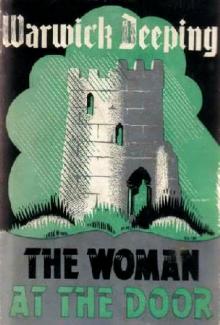 The Woman at The Door
The Woman at The Door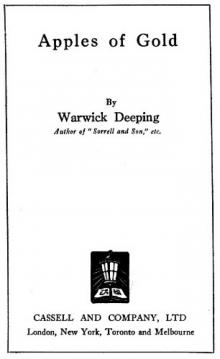 Apples of Gold
Apples of Gold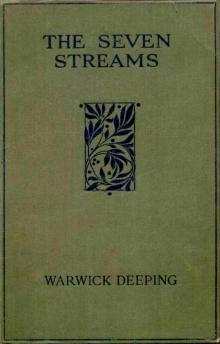 The Seven Streams
The Seven Streams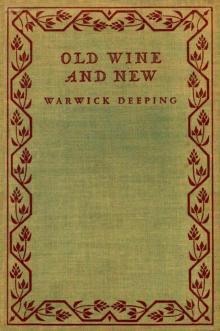 Old Wine and New
Old Wine and New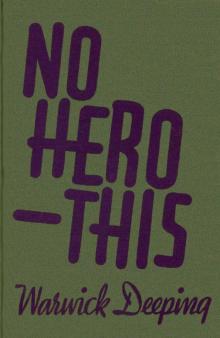 No Hero-This
No Hero-This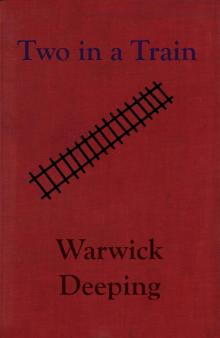 Two in a Train
Two in a Train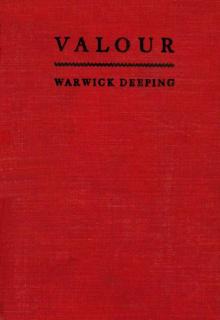 Valour
Valour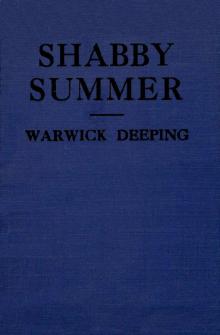 Shabby Summer
Shabby Summer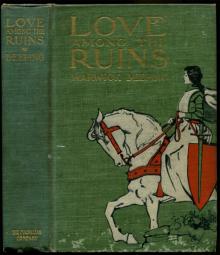 Love Among the Ruins
Love Among the Ruins The Short Stories of Warwick Deeping
The Short Stories of Warwick Deeping